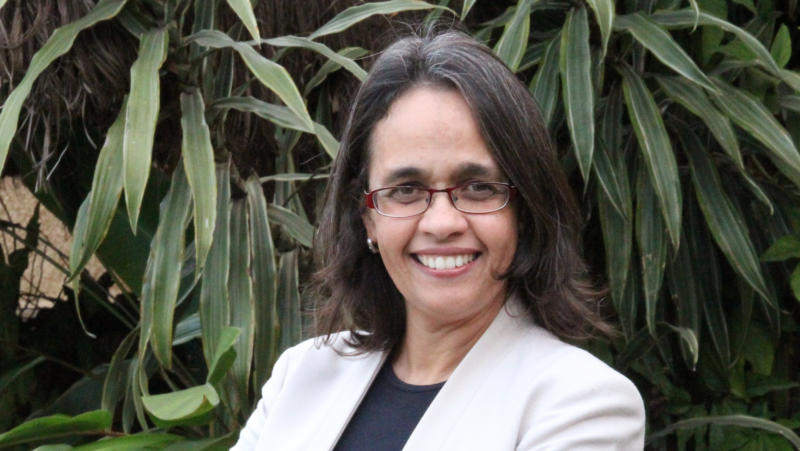
Professor Rousiley Maia, coordinator of the Media and Public Sphere Research Group from the Department of Social Communication, is one of the event’s speakers.
Photo: personal archive
Amid the spread of fake news, hate speech, and polarization, democracy faces an urgent challenge: how to ensure that diverse voices are heard and that public debate is of high quality?
To reflect on this topic, the colloquium “Perspectives on Public Spheres and Networks of Publics” will be held on October 6, 2025, in auditorium A102 of the Center for Teaching Activities 2 (CAD 2), starting at 2:00 p.m. Open to UFMG undergraduate and graduate students and others interested in the topic, the event will award certificates of participation upon registration via the Even3 platform.
Bringing together researchers from Brazil and abroad, the colloquium aims to investigate how digital communication shapes everyday discussions and influences democratic life. The opening lecture will be given by Professor Axel Bruns of the Queensland University of Technology in Australia. Following this, the first panel, “Across public spheres and networks of publics,” will discuss the configurations and dynamics of the public sphere as a “network of publics,” where different voices intertwine, clash, and overlap in processes of democratic rupture or resistance and resilience. Participating on the panel are UFMG professors Rousiley Maia, from the graduate program in Social Communication, and Ricardo Fabrino Mendonça, from the graduate program in Political Science.
At 4:30 pm, the second panel, “Dealing with algorithmic logics, visual challenges, fragmentation, and listening in the public sphere,” will focus on the specific dynamics that constitute public debate, as well as the challenges of understanding algorithmic logics, including visual dimensions, fragmentation processes, and different forms of listening involving multiple audiences. The panel will feature Professors Afonso de Albuquerque of the Fluminense Federal University (UFF), Diógenes Lycarião of the Federal University of Ceará (UFC), Hans Asenbaum of the University of Canberra in Australia, and Tariq Choucair of the Queensland University of Technology. All presentations will be given in English, with simultaneous translation into Portuguese.
The event is sponsored by the Media and Public Sphere Research Group (EME/UFMG), affiliated with the Institute for Advanced Transdisciplinary Studies (IEAT) at UFMG, and supported by the National Institute of Science and Technology in Information Disputes and Sovereignties (INCT-DSI). The initiative is also part of the celebrations for the 30th anniversary of the UFMG graduate program in Social Communication and the 25th anniversary of the founding of EME/UFMG.
Research Seminars on Public Spheres
As part of the debate activities held by the EME/UFMG, the Research Seminars: Designing Empirical Research on Public Spheres will be held on October 7th, from 10:00 am to 6:00 pm, in the Congregation Room of the UFMG School of Philosophy and Human Sciences.
The seminar will bring together researchers in core presentations dedicated to analyzing methodological and theoretical challenges in different research designs, including reflections on the relationship between formal and informal political representatives, political and cultural interactions in the face of authoritarian attacks, and the development of strategies to strengthen democracy. The seminar is open to graduate students. A certificate of participation will be issued upon registration.
Deliberative Democracy and the Public Sphere in Debate
Recent research findings by researchers at EME/UFMG are published in three important works, available in digital format. In the book “The Deliberative System and Interconnected Media in Times of Uncertainty,” published by Palgrave Press in 2023, the authors discuss processes of justification and emotional concerns that both connect and divide groups in social conflicts, through debates in legislative, activist, and everyday life spaces. In the article “Deliberative Theory for Re-Focusing the Concept, Measurement, and Analysis of Substantive Reasons in Political Discussions,” published in 2025 by the journal Constellations, the researchers seek, based on theories of deliberative democracy, to understand the substantive content of reasons as a tool for analyzing a set of interconnected actors in multiple spaces. In the book Public Sphere in Brazil: Different Faces of Social Conflicts, Ruptures and Democratic Reconstruction, published by the Federal University of Bahia Press (Edufba) in 2025, the authors discuss how the public sphere is in constant conflict and transformation, culminating in both concerns about the erosion of democratic life and efforts towards democratization.